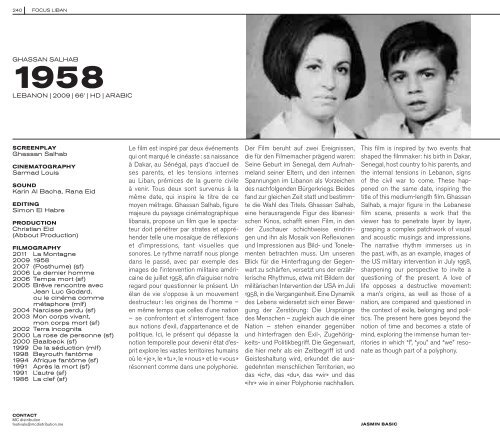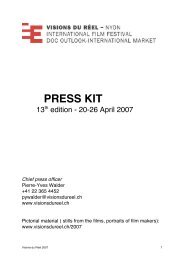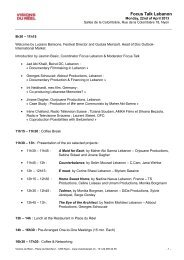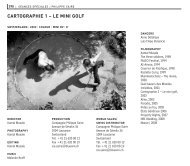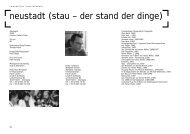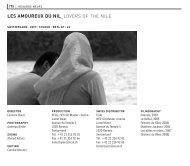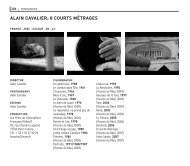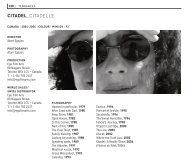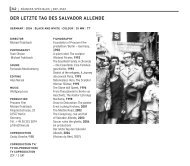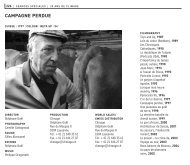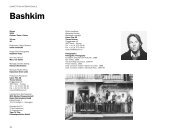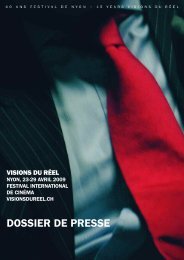Katalog 2013.pdf - Visions du Réel
Katalog 2013.pdf - Visions du Réel
Katalog 2013.pdf - Visions du Réel
You also want an ePaper? Increase the reach of your titles
YUMPU automatically turns print PDFs into web optimized ePapers that Google loves.
240 focus liban<br />
Ghassan Salhab<br />
1958<br />
Lebanon | 2009 | 66’ | HD | Arabic<br />
Screenplay<br />
Ghassan Salhab<br />
Cinematography<br />
Sarmad Louis<br />
Sound<br />
Karin Al Bacha, Rana Eid<br />
Editing<br />
Simon El Habre<br />
Pro<strong>du</strong>ction<br />
Christian Eid<br />
(Abbout Pro<strong>du</strong>ction)<br />
Filmography<br />
2011 La Montagne<br />
2009 1958<br />
2007 (Posthume) (sf)<br />
2006 Le dernier homme<br />
2006 Temps mort (sf)<br />
2005 Brêve rencontre avec<br />
Jean Luc Godard,<br />
ou le cinéma comme<br />
métaphore (mlf)<br />
2004 Narcisse per<strong>du</strong> (sf)<br />
2003 Mon corps vivant,<br />
mon corps mort (sf)<br />
2002 Terra incognita<br />
2000 La rose de personne (sf)<br />
2000 Baalbeck (sf)<br />
1999 De la sé<strong>du</strong>ction (mlf)<br />
1998 Beyrouth fantôme<br />
1994 Afrique fantôme (sf)<br />
1991 Après la mort (sf)<br />
1991 L’autre (sf)<br />
1986 La clef (sf)<br />
Le film est inspiré par deux événements<br />
qui ont marqué le cinéaste : sa naissance<br />
à Dakar, au Sénégal, pays d’accueil de<br />
ses parents, et les tensions internes<br />
au Liban, prémices de la guerre civile<br />
à venir. Tous deux sont survenus à la<br />
même date, qui inspire le titre de ce<br />
moyen métrage. Ghassan Salhab, figure<br />
majeure <strong>du</strong> paysage cinématographique<br />
libanais, propose un film que le spectateur<br />
doit pénétrer par strates et appréhender<br />
telle une mosaïque de réflexions<br />
et d’impressions, tant visuelles que<br />
sonores. Le rythme narratif nous plonge<br />
dans le passé, avec par exemple des<br />
images de l’intervention militaire américaine<br />
de juillet 1958, afin d’aiguiser notre<br />
regard pour questionner le présent. Un<br />
élan de vie s’oppose à un mouvement<br />
destructeur : les origines de l’homme –<br />
en même temps que celles d’une nation<br />
– se confrontent et s’interrogent face<br />
aux notions d’exil, d’appartenance et de<br />
politique. Ici, le présent qui dépasse la<br />
notion temporelle pour devenir état d’esprit<br />
explore les vastes territoires humains<br />
où le « je », le « tu », le « nous » et le « vous »<br />
résonnent comme dans une polyphonie.<br />
Der Film beruht auf zwei Ereignissen,<br />
die für den Filmemacher prägend waren:<br />
Seine Geburt im Senegal, dem Auf nahme<br />
land seiner Eltern, und den internen<br />
Spannungen im Libanon als Vorzeichen<br />
des nachfolgenden Bürgerkriegs. Beides<br />
fand zur gleichen Zeit statt und bestimmte<br />
die Wahl des Titels. Ghassan Salhab,<br />
eine herausragende Figur des libanesischen<br />
Kinos, schafft einen Film, in den<br />
der Zuschauer schichtweise eindringen<br />
und ihn als Mosaik von Reflexio nen<br />
und Impressionen aus Bild- und Ton elementen<br />
betrachten muss. Um unseren<br />
Blick für die Hinterfragung der Gegenwart<br />
zu schärfen, versetzt uns der erzählerische<br />
Rhythmus, etwa mit Bildern der<br />
militärischen Intervention der USA im Juli<br />
1958, in die Vergangenheit. Eine Dynamik<br />
des Lebens widersetzt sich einer Bewegung<br />
der Zerstörung: Die Ursprünge<br />
des Menschen – zugleich auch die einer<br />
Nation – stehen einander gegenüber<br />
und hinterfragen den Exil-, Zugehörigkeits-<br />
und Politikbegriff. Die Gegenwart,<br />
die hier mehr als ein Zeitbegriff ist und<br />
Geisteshaltung wird, erkundet die ausgedehnten<br />
menschlichen Territorien, wo<br />
das «ich», das «<strong>du</strong>», das «wir» und das<br />
«ihr» wie in einer Polyphonie nachhallen.<br />
This film is inspired by two events that<br />
shaped the filmmaker: his birth in Dakar,<br />
Senegal, host country to his parents, and<br />
the internal tensions in Lebanon, signs<br />
of the civil war to come. These happened<br />
on the same date, inspiring the<br />
title of this medium-length film. Ghassan<br />
Salhab, a major figure in the Lebanese<br />
film scene, presents a work that the<br />
viewer has to penetrate layer by layer,<br />
grasping a complex patchwork of visual<br />
and acoustic musings and impressions.<br />
The narrative rhythm immerses us in<br />
the past, with, as an example, images of<br />
the US military intervention in July 1958,<br />
sharpening our perspective to invite a<br />
questioning of the present. A love of<br />
life opposes a destructive movement:<br />
a man’s origins, as well as those of a<br />
nation, are compared and questioned in<br />
the context of exile, belonging and politics.<br />
The present here goes beyond the<br />
notion of time and becomes a state of<br />
mind, exploring the immense human territories<br />
in which “I”, “you” and “we” resonate<br />
as though part of a polyphony.<br />
Contact<br />
MC distribution<br />
festivals@mcdistribution.me<br />
Jasmin Basic


